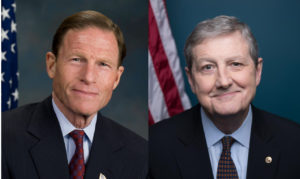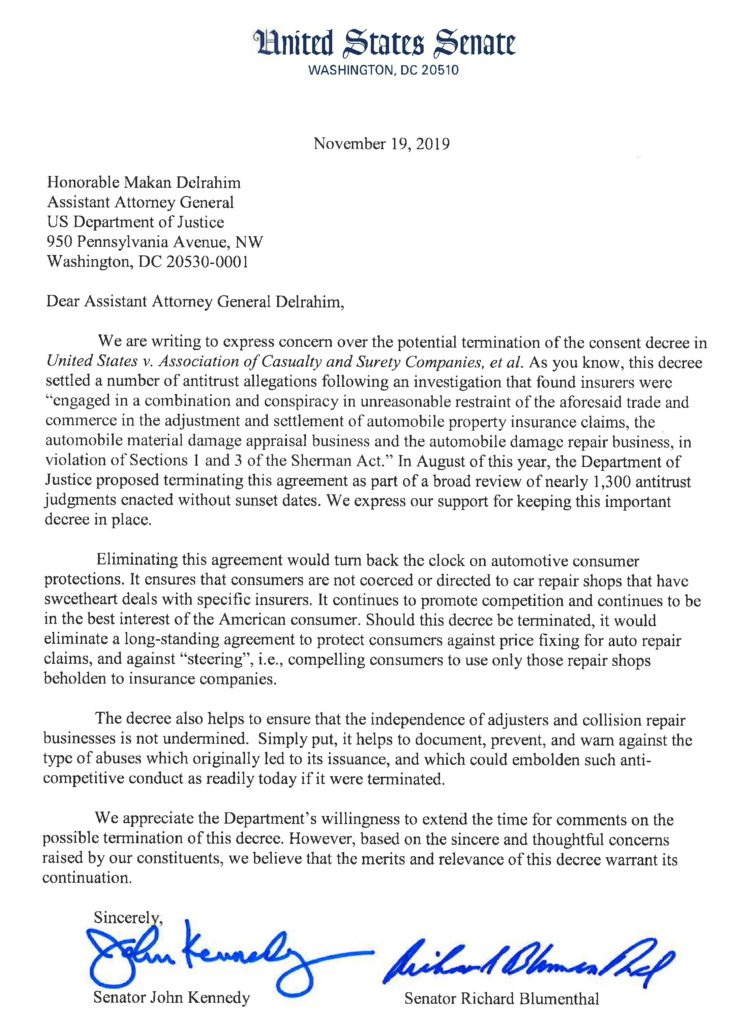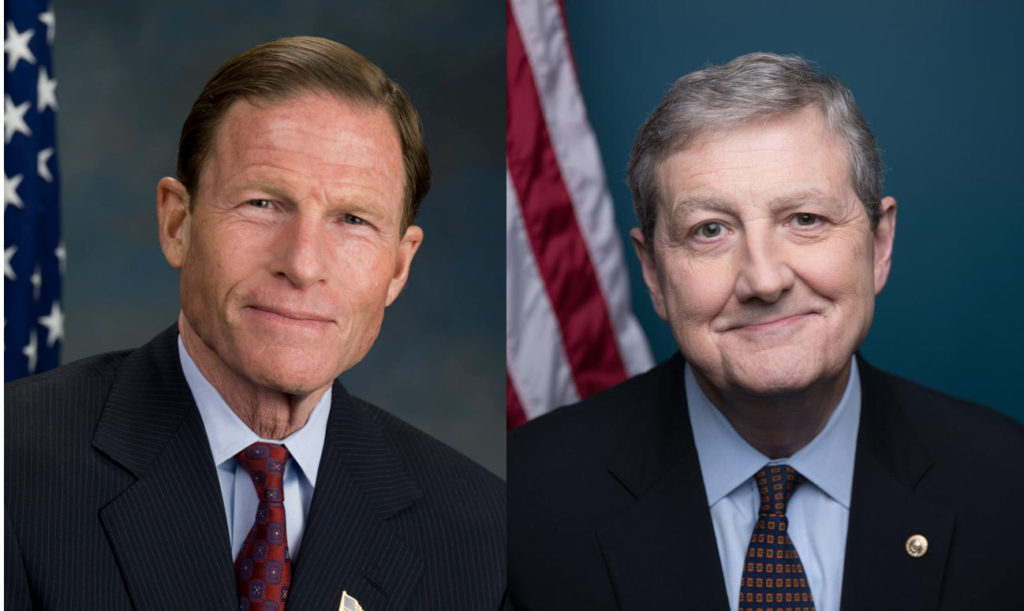
Bipartisan letter finds Sens. Kennedy, Blumenthal urging DOJ to keep 1963 Consent Decree
By onAnnouncements | Associations | Business Practices | Insurance | Legal | Market Trends | Repair Operations
Citing the need to protect consumers and preserve body shops and adjusters’ independence, Sens. Richard Blumenthal, D-Conn., and John Kennedy, R-La., on Tuesday asked the Department of Justice to retain the 1963 Consent Decree governing auto insurers.
Their bipartisan championing of the critical consumer and collision industry issue might prompt other support from lawmakers. Both men also sit on the Senate Judiciary Committee, which provides congressional oversight over the DOJ.
The DOJ in August proposed terminating the 1963 Southern District of New York settlement in U.S. v. Association of Casualty and Surety Companies, et al as part of a 2018 initiative to eliminate some of the nearly 1,300 “legacy” antitrust judgments enacted without sunset dates. Starting in 1979, the government’s policy has been to include an automatic end date — usually 10 years — regarding antitrust judgments.
Public comment on the proposal ended Oct. 2, having been extended by a month in response to concerns Blumenthal expressed earlier this year.
The Society of Collision Repair Specialists on Thursday said the Consent Decree was one of the two most commented upon antitrust judgment proposals out of all of those the DOJ sought to end.
According to an I-CAN copy of the 1963 complaint settled by the decree, insurers were alleged to have since about 1947 “engaged in a combination and conspiracy in unreasonable restraint of the aforesaid trade and commerce in the adjustment and settlement of automobile property insurance claims, the automobile material damage appraisal business and the automobile damage repair business, in violation of Sections 1 and 3 of the Sherman Act. …
“The aforesaid combination and conspiracy has consisted of a continuing agreement and concert of action among the defendants and co-conspirators to eliminate competition among member companies in the adjustment and settlement of automobile property insurance claims, among appraisers and among repair shops, in order to control and depress automobile material damage repair costs through boycott, coercion and intimidation of repair shops.”
Under the terms of the 1963 settlement, no wrongdoing was acknowledged by the signatory insurance trade groups nor alleged by the DOJ. Signers included the Association of Casualty and Surety Companies, American Mutual Insurance Alliance and National Association of Mutual Casualty Companies. The Association of Casualty and Surety Companies later was merged into the American Insurance Association, which merged with the Property Casualty Insurers Association of America effective Jan. 1 to create today’s American Property Casualty Insurance Association.
The decree bound the three trade groups and their “officers, directors, agents, servants, employees, committees, successors and assigns, and upon all other persons in active concert or participation with any defendant who shall have received actual notice of this Final Judgment by personal service or otherwise.”
Fears of steering, price-fixing
“Eliminating this agreement would turn back the clock on automotive consumer protections. It ensures that consumers are not coerced or directed to car repair shops that have sweetheart deals with specific insurers,” Blumenthal and Kennedy wrote to Assistant Attorney General Makan Delrahim. “It continues to promote competition and continues to be in the best interest of the American consumer. Should this decree be terminated, it would eliminate a long-standing agreement to protect consumers against price fixing for auto repair claims, and against ‘steering’, i.e., compelling consumers to use only those repair shops beholden to insurance companies.”
The letter‘s timing is perfect. The government’s antitrust termination program drew headlines this week as Delrahim announced Monday plans to terminate the landmark 1948 “Paramount decrees” governing the movie studios.
“We have determined that the decrees, as they are, no longer serve the public interest, because the horizontal conspiracy – the original violation animating the decrees – has been stopped,” Delrahim says in his prepared remarks. “Along with the passage of time, the Paramount decrees have already remedied the effects of the violation, ridding the industry of ‘all taint’ of the horizontal conspiracy and undoing what the conspiracy had achieved. Changes over the course of more than half a century also have made it unlikely that the remaining defendants can reinstate their cartel. Evolution in antitrust law has further made blanket prohibitions of certain vertical restraints inappropriate. Accordingly, the Division finds the consent decrees no longer meet consumer interests.”
And yet, the government apparently wasn’t entirely sure. Delrahim said the DOJ would still prohibit block booking and circuit dealing during a two-year sunset period, though he said this was just to give studios and theaters “a period of transition to adjust to any licensing proposals that seek to change the theatre-by-theatre and film-by-film licensing structure currently mandated by the decrees.”
Kennedy and Blumenthal also warned the end of the 1963 Consent Decree could lead to insurers resuming their prior behavior.
“The decree also helps to ensure that the independence of adjusters and collision repair businesses is not undermined,” they wrote. “Simply put, it helps to document, prevent, and warn against the type of abuses which originally led to its issuance, and which could embolden such anti-competitive conduct as readily today if it were terminated.
“We appreciate the Department’s willingness to extend the time for comments on the possible termination of this decree. However, based on the sincere and thoughtful concerns raised by our constituents, we believe that the merits and relevance of this decree warrant its continuation.”
The 1963 Consent Decree ordered the insurance trade groups to end the “Independent Appraisal Plan, sometimes known as the Automotive Damage Appraisal Plan.” It also prohibited them from enacting “any plan, program or practice” intended to or creating the effect of:
(1) sponsoring, endorsing or otherwise recommending any appraiser of damage to automotive vehicles;
(2) directing, advising or otherwise suggesting that any person or firm do business or refuse to do business with (a) any appraiser of damage to automotive vehicles with respect to the appraisal of such damage, or (b) any independent or dealer franchised automotive repair shop with respect to the repair of damage to automotive vehicles;
(3) exercising any control over the activities of any appraiser of damage to automotive vehicles;
(4) allocating or dividing customers, territories, markets or business among any appraisers of damage to automotive vehicles; or
(5) fixing, establishing, maintaining or otherwise controlling the prices to be paid for the appraisal of damage to automotive vehicles, or to be charged by independent or dealer franchised automotive repair shops for the repair of damage to automotive vehicles or for replacement parts or labor in connection therewith, whether by coercion, boycott or intimidation or by the use of flat rate or parts manuals or otherwise.
SCRS said Thursday it has been working since the end of the comment period to develop support from House and Senate Judiciary Committee members for retaining the Consent Decree.
“The association has arranged multiple meetings in D.C. with subject matter experts on the Consent Decree, with key offices on Capitol Hill,” SCRS wrote in a news release Thursday.
SCRS said its work led to Kennedy and Blumenthal’s letter, and the organization would continue its efforts on Capitol Hill.
“This is an excellent example of policy makers who listen intently to the concerns of their constituents and who provide outstanding leadership on their behalf,” SCRS Chairman Brett Bailey (A&B) said in a statement. “We are enormously grateful to Senator Kennedy and Senator Blumenthal for this letter. This is an issue of great importance not only to collision repairers across the nation, but to every American consumer. These Senators have demonstrated that party lines don’t have to get in the way of being champions for maintaining consumer protections. They understand that this Decree is still valuable, applicable and necessary in the market today. SCRS will continue to advocate to other Members of Congress and to urge them to communicate with DOJ and to express their commitment to preserving the Decree on behalf of consumers and small businesses in their states and districts.”
Be heard: House Judiciary members can be found here. Senate Judiciary members can be found here.
More information:
Letter from Sens. Blumenthal and Kennedy to DOJ
Sens. Richard Blumenthal and John Kennedy, Nov. 19, 2019
“Senators Kennedy and Blumenthal Send Consent Decree Support Joint Letter to Department of Justice”
Society of Collision Repair Specialists, Nov. 21, 2019
Images:
U.S. Sens. Richard Blumenthal, D-Conn., and John Kennedy, R-La. (Provided by Blumenthal and Kennedy)
Citing the need to protect consumers and preserve body shops and adjusters’ independence, Sens. Richard Blumenthal, D-Conn., and John Kennedy, R-La., on Nov. 19, 2019, asked the Department of Justice to retain the 1963 Consent Decree governing auto insurers. (Provided by Society of Collision Repair Specialists)


